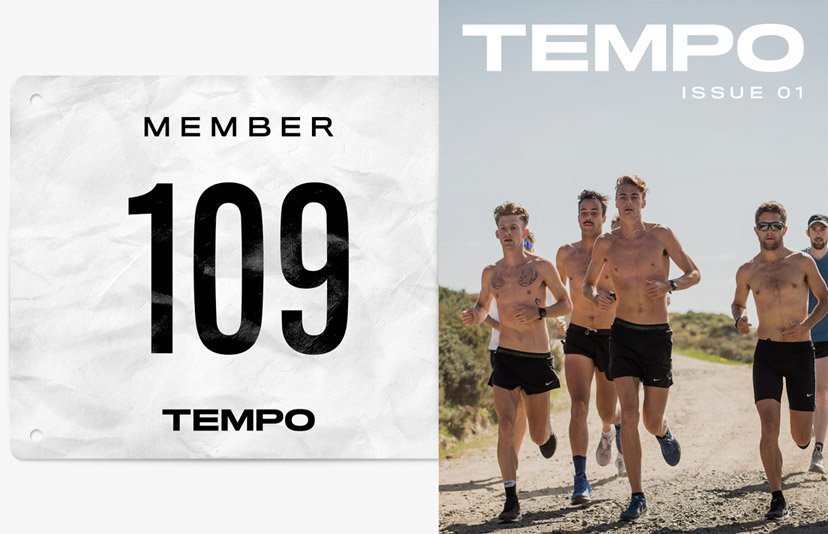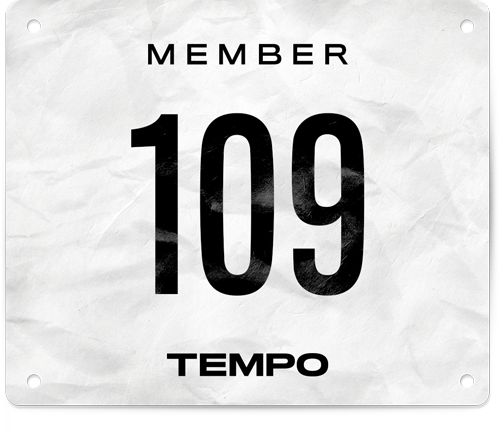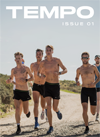Performance
Andy Buchanan: Here and Now
Learnings from the London Marathon
Only a year ago, Australia marathon record holder Andy Buchanan says he was too scared to risk it all for the win.
“I was always too scared to put myself in a position where I could possibly win the race or fuck it up,” Andy says of his mindset before his breakthrough streak began in mid-2024. “I did not want to put myself in that position, so I wouldn’t give myself every opportunity to win. I was scared that if I did that and then it didn’t turn out, what would that look like?”
That all changed with his win at the Gold Coast Half Marathon in early July. “Gold Coast was the first time where I thought, ‘I want to win this and I want to put myself in a position to win it.’ I took the lead with a K to go and kind of ran away with it,” he says. “That was a real mental shift for me—don’t be too scared to put yourself out there, and don’t be scared to have a crack. If you have a crack and it doesn’t work out, who cares what other people think?”
“The marathon always wins and you really need to respect it. It’s a great event, but it won’t always be sunshine and rainbows, and that’s okay.”
Andy Buchanan
Fast forward to the first of December and Andy was crossing the finish line of the Valencia Marathon with a new national record. The five months between had seen him receive a late Olympics call-up, win the Melbourne Half Marathon and set himself on a trajectory that has changed how the running world sees him.
But when we caught up with Andy after his recent London Marathon performance, where he ran 2:09:11 to place 11th, he was processing a different type of race experience. One that hadn’t gone quite to plan but was nevertheless teaching him valuable lessons about the mental side of marathon running.
External expectations have dramatically shifted for Buchanan over the past year, but he seems unfazed by the heightened scrutiny.
“I feel like I’m viewed as a completely different runner these days, even though I see myself as the same person,” he says. “But I don’t actually feel any pressure. In London, I felt pressure on myself to run well, but I didn’t feel any pressure from anywhere else. I seem to be quite good at changing that into ‘Oh, people care about how I’m going’ or ‘people think that I’m deserving of this.’”
It’s a mindset that extends back to his unexpected Olympics call-up, when he found himself replacing the injured Brett Robinson with just three weeks’ notice.
“I had no expectations because it all happened so fast,” he recalls. “My manager and coach were saying, ‘Look, this is a great opportunity and you have absolutely nothing to lose because no one’s expecting anything from you.’ We flipped it into, ‘Hey, my secret weapon is I haven’t been thinking about the Olympics for the last four years.’”
Behind Andy’s breakout performances lies work that rarely makes the headlines: sessions with a sports psychologist that fundamentally changed his approach to racing. “I do a lot of stuff with the sports psych. It took a while to get some good results there, but I feel like that’s definitely changed things,” he says.
“I feel like I’m viewed as a completely different runner these days, even though I see myself as the same person.”
Andy Buchanan
Andy says the mental shift he experienced from Gold Coast only grew stronger throughout 2024. “It just snowballed from there and got out of control very quickly. In a good way.” That snowball led him to Valencia in December 2024, where he shocked even himself by breaking the Australian marathon record with a time of 2:06:22.
“I didn’t think I would run that fast. I didn’t think I’d get anywhere near the record,” Andy admits. “I wanted to, but I didn’t think I would.”
“There were definitely some moments in my head where I dreamt of it, but that was like your wildest dreams. It’s like kicking the winning goal after the siren to win the Grand Final—you’re like, this isn’t gonna happen. I thought maybe I could run 2:07, mid to low, but I did not think I was going to get anywhere near 2:06.”
The national record pushed Andy into a new phase of his running career, one where he was no longer flying under the radar. In his own mind, there was still something to prove.
“I wanted to run faster, and I was really keen to represent my country again. I felt like people thought Valencia was a bit of a fluke. I don’t know if they thought that, but that’s what I thought they were thinking.”
“I just felt like I never got into a rhythm. I felt like I was not relaxed in this flow state that I’ve been in in marathons.”
Andy Buchanan on his London Marathon
Following Valencia, Andy soon set his sights on the London Marathon. That’s the first one I wanted to have a crack at,” he says, explaining that he was attracted by the quality of the elite field and the experience of running his first major – his sixth marathon – in the historic city. On our video call, with the 34-year-old having an easy post-race morning at the Teddington house several Australian elites use as a base, he raves about how London embraces the marathon. “It’s crazy the way that the city gets around it,” he says.
Indeed, this year record crowds turned out for an event that just stole New York City’s crown for the world’s biggest marathon, with 56,640 finishers. Over 800,000 spectators crammed the footpaths and cheer zones, 60,000 more than last year.
Heading into the race, Andy was confident. He’d trained harder than before Valencia, logging several 200km weeks, and felt fitter. He’d even managed to fit in a shakeout run the day before with Australian ultra star Nedd Brockmann. The Olympian’s plan was to set out at a controlled pace with the 2:06:30 group, aiming to negative split the race. He was hopeful of a PB, which, when you’re Andy Buchanan, means an Australian record.
“I was feeling really relaxed. I was confident in my plan and excited and looking forward to it,” he says.
But the marathon had ideas of its own, and from early in the race, Andy sensed things weren’t clicking.
“I just felt like I never got into a rhythm. I felt like I was not relaxed in this flow state that I’ve been in in marathons. Nothing felt like it was coming easy.” By halfway, he was already feeling how he would normally expect to feel at 30km. “I was like, ‘Oh, this might not be my day today.’”
The stretch between 25km and 30km proved particularly challenging. “For me that’s the hardest part of a marathon because you are actually so far from the finish line, but you are in the race and you’ve been running for a while,” he explains. “When I get to 30K, it’s like, right, just get to 35 and you’ve just got one more drink station, and then you’re there. In your head you can trick yourself. Whereas at 25K, you’re so far from home.”
“One of my cues to get me away from these negative thoughts and this negative spiral is I listen to my shoes and the noise they make on the ground.”
Andy Buchanan
“I was having some pretty negative thoughts. I knew I wasn’t going to run really well, and that hit hard. I was thinking, what happens if I start running four-minute Ks? Do I keep running? What does that look like? It just felt like I was dying a slow death as the Ks went on and the K markers were taking ages to appear.”
In these moments, Buchanan reaches for mental tools to reset his focus.
“One of my cues to get me away from these negative thoughts and this negative spiral is I listen to my shoes and the noise they make on the ground. I feel like it’s a really nice noise when you are running well. With the shoes these days, it’s a real slap, but I like it.”
The problem in London? “You cannot hear your shoes at any point of the course because of the crowds—it’s just too loud—other than when I was in this tunnel. And I was in this tunnel and I thought, ‘Oh, I can finally hear my shoes.’ And I was feeling good.”
Coming towards the finish line, Andy faced an unfamiliar emotion: disappointment.
“Turning that corner and seeing the finishing clock at like 2:08:30, and I had 200 metres to go, I was like, ‘Oh, this sucks.’ Every time I’ve gotten onto that finishing straight and seen the clock, I’ve been really happy and surprised. Whereas this one was like, ‘I’m pretty disappointed with this; it’s going to be 2:09 something. I feel like this is a step back.’”
After the race, he sat near the finish line, processing what had happened.
“It wasn’t a moment of taking it in, it was kind of like, ‘Shit, that was hard work.’ A bit of reflection, really, and I felt like I’d ran my first marathon because the others had just gone so smoothly compared to this. I feel like I learnt a fair bit about myself and a fair bit about the marathon.”
“If you’ve ran 2:09 and finished 11th at London on a rough day, you’re doing okay.”
Ben St Lawrence
It took some perspective from another Australian running great to help shift his thinking.
“Ben St Lawrence was there. He came over and said, ‘Well done.’ I said I was pretty disappointed—it was rough out there. And he said, ‘If you’ve ran 2:09 and finished 11th at London on a rough day, you’re doing okay.’ And I was like, ‘Yeah, true. That’s actually a good way of putting it.’”
St Lawrence’s words “at London” are worth thinking about. London is not a fast course, and the stellar elite field was arguably stronger than Valencia 2024’s. It included eventual winner Sabastian Sawe, who had also taken gold in the Spanish city; Jacob Kiplimo in his debut; Olympic champion Tamirat Tola; Alex Mutiso; and an impressive return from the GOAT, Eliud Kipchoge. Against these odds, Andy actually improved on his 16th-place result in Valencia.
In the days following, Andy’s relationship with the result has continued to evolve. “Overall, I was disappointed. I was wanting more, and I was on this bit of a hot streak and had run every marathon that I’d been really proud of. This one initially I wasn’t proud of, but the more time I’m sitting with it, the prouder I’m getting. I feel like I learnt a lot and it was an awesome experience.”
Asked to pinpoint what he thinks accounts for his being three minutes slower than in Valencia, Andy doesn’t point to the heat, even though plenty of others have blamed the 22ºC day. He says he never felt the need to douse himself under a water bottle. Instead, he points to possible overtraining as well as the differences between the Spanish and English courses.
“I think I did a little bit too much,” he says. “I got a little bit too greedy. And between eight weeks and three weeks out I ran a few too many weeks over 200K, which with my busy schedule of work it was just a little bit too much. I think I dug myself a bit of a hole that I then couldn’t get out of.
“So there was that part, and I think the other thing was the course just isn’t as fast as Valencia, which was my last marathon, and that’s what I was expecting from a marathon, and it wasn’t that. So yeah, probably those two contributing factors.”
“This one initially I wasn’t proud of, but the more time I’m sitting with it, the prouder I’m getting. I feel like I learnt a lot and it was an awesome experience.”
Andy Buchanan
He’s heading to Portugal next, but expects his feelings about the race will continue to shift at least until he gets home to Australia.
“It’s often the flight home, that’s when it hits, because I’m going back to reality. London’s been a big goal for me since December and now all of a sudden that’s not there. It’s going to be a weird feeling getting home and then, for me, that drive home from the airport [from Melbourne to Bendigo], not having achieved my goal—I feel like that’s when it’s probably going to hit. But at the moment, I’ve come to peace with it.”
Asked about his biggest takeaways from London, Andy offers two reflections.
The first captures the unique spirit of marathon running: “Running is the best sport in the world. The emotion beforehand, during and after—from everyone, not just me—is phenomenal. We were at a pub in London and someone would walk past with a finisher’s medal and everyone in the pub just starts clapping. Where else does that happen?”
His second takeaway is more personal: “The marathon always wins and you really need to respect it. It’s a great event, but it won’t always be sunshine and rainbows, and that’s okay.”
Looking ahead, Andy plans to reset, run some local races in Australia and target the World Championships in September, followed by a return to Valencia at the end of 2025.
“I still want to run fast. I want to run fast in places other than Valencia, but then I want to go back to Valencia and run even faster again. And really get the Australian record down to what a lot of other countries have these days, which is 2:04, 2:05. I’d love to run 2:05-something.”
He’s also recognised the value in spreading his focus across different races and distances throughout the year.
“For me to get faster as a marathoner, I had to improve my speed over the half marathon. If I can get more comfortable running faster, that’s going to help the marathon,” he explains. “I think people can get stuck in this marathon grind, where they’re just doing two marathons a year and that’s all they’re training for.” (Buchanan certainly put this into practice when he ran a half marathon PB in Marugame, Japan, at the beginning of February: 1:00:28 for seventh place.)
“My next marathon is at the World Champs, which is in September—that’s so far away and I don’t want to be thinking about that race for the next few months. If I can find some little goals along the way, like Gold Coast or something else, it’s really good. Then you’re not just thinking ‘I’ve got this marathon’ and run it a thousand times in your head before you get to the start line.”
There’s a universal lesson in Andy’s experience, one that applies to runners of all levels: marathons don’t always go to plan, no matter how prepared you are. The true measure of a marathoner isn’t just found in their fastest times, but in how they process, learn from, and build upon the inevitable tough days.
As Andy now knows, sometimes the marathon has to win before you can truly appreciate what it takes to succeed.


